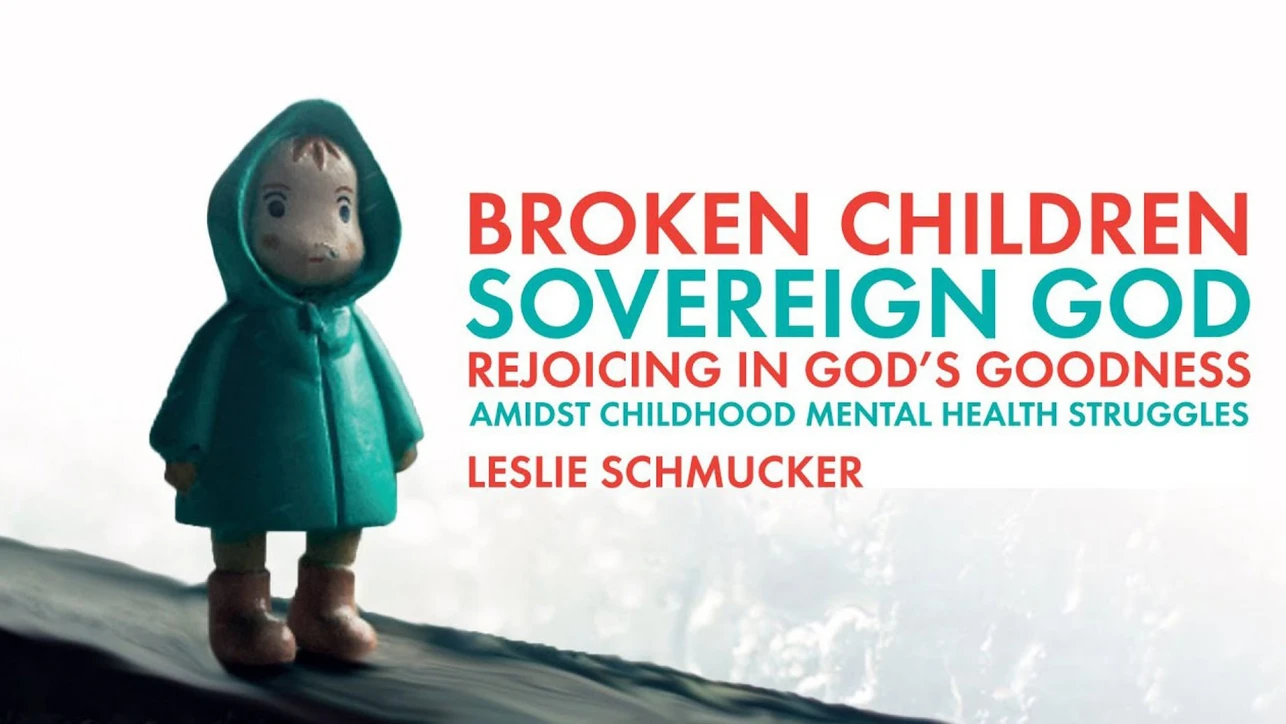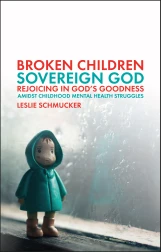Broken Children, Sovereign God– An Overview
MENTAL ILLNESS REALITY: One in six American children suffer from diagnosed mental disorders. Here is one mother's heartbreaking journey that reveals how God's sovereign goodness becomes our ultimate comfort when raising broken children.

The Backdrop
The fall of man altered every atom of creation. From manhood to motherhood to matrimony, nothing is as it should be. Some after–effects of the fall are mere annoyances, like the fear of spiders, or indigestion, or having to wear uncomfortable clothing. But most by–products of the fall take the breath from your lungs, wrench your heart from your chest, and are counted in tears. Childhood mental illness is one of those by–products.
According to the American Academy of Family Physicians (AAFP), one in six American children between the ages of six and seventeen have a diagnosed mental health disorder, the most prevalent of which include anxiety, depression, and attention deficit hyperactivity disorder (ADHD). The CDC reports that suicide is the second leading cause of death among American children aged ten to fourteen. Mental Health America reports that between 2020 and 2021, there was a 13% increase in cases of children experiencing major depressive episodes. That is 206,000 children in the United States alone. Whether these increases are due to broader screening methods or an actual rise in cases, it remains that a significant number of American households are affected by varying degrees of childhood mental illness.
The World Health Organization reports similar statistics globally, claiming that “mental health conditions account for 16% of the global burden of disease and injury in people aged ten to nineteen years.” It reports that up to 20% of children worldwide are diagnosed with a mental health disorder, with half of those disorders manifesting by age fourteen. Globally, suicide is the third leading cause of death in children aged fifteen to nineteen years. More than half of these children do not receive treatment for their disorders.
There are myriad reasons for the uptick in mental health challenges among our children. We can point to social media, Covid, a removal of prayer and Bible reading from the schools, fatherlessness, or disastrous government policies. But no matter the cause, the fallout has left thousands of families in despair, confusion, and impotent desperation.
If you are raising a child who is stricken with mental illness, whether your child is adopted or biological, you may know the heartache, intensity, and uncertainty of the day to day, and the helplessness and frustration of navigating a life full of disconnects in logic, embarrassing behavior, and fear for the future. God sees you, he knows you and your child, and he shares your pain. He is sovereign, he is good, and he has not left us alone in our affliction.
God sees you, he knows you and your child, and he shares your pain. He is sovereign, he is good, and he has not left us alone in our affliction.
The Theme
Though Broken Children, Sovereign God was written against the backdrop of raising a child with mental health challenges with the hope of helping anyone walking that road, the theme of the book is God himself. When we were raising our daughter Jackie, we were immersed in two distinct worlds: First, the life–intruding world of childhood mental illness, and secondly, the life–preserving world of the goodness of God.
Our daily existence during the years of raising our daughter was consumed by her care. On any given day, our calendar was replete with counseling appointments, family therapy sessions, and medical specialist consultations, in addition to normal kid stuff, like soccer games and ballet lessons. This among the activities my other two children were involved in, all beckoning and jostling for our attention. My husband and I often felt like we were split into many pieces, each piece clamoring for priority. In the free spaces of our calendar, life at home was filled with lie detecting, stolen item finding, temper tantrums, or long and exhausting verbal de–escalations, in addition to run–of–the–mill kid stuff, like homework help, book reading, devotion time, and tuck–ins. As our daughter grew into adolescence, police visits were added to the list. To say we relied on God with everything we had cannot be overstated. We were laid bare, and God was all we had. And he didn’t disappoint.
To say we relied on God with everything we had cannot be overstated. We were laid bare, and God was all we had. And he didn’t disappoint.
Jesus Christ is our High Priest. He is also our earthly Brother, “the firstborn of creation” (Col. 1:15–19). While on earth, he experienced pain, rejection, trial, frustration, and even fruitlessness in his ministry (think his trip to Nazareth– Matthew 13:54–58; Mark 6:1–6; Luke 4:16–31). Every single thing we experienced while raising our daughter, Jesus experienced in his earthly life. Through any trial, no matter how intense or painful, we can be rest assured that our prayers are heard with sympathy and compassion. Remember, “we do not have a high priest who is unable to sympathize with our weaknesses, but one who in every respect has been tempted as we are, yet without sin” (Hebrews 4:15). And Jesus is supremely good.
A Christian who has come to the conclusion that God is good has not done so easily. We come to it through sweat, tears, and wrestling. Like Jacob, those of us who have walked this road will walk it with a limp for the rest of our life after wrestling with the God we struggle to trust (Genesis 32:25). But through the struggle, with a broken heart, we must proclaim the absolute goodness of the God we have come to know and love. If the Creator of the universe is not good, everything falls into hopelessness and despair. Apart from Jesus Christ, there is nowhere else to turn (John 6:68). The ever–present and pervasive pain that characterizes life on earth notwithstanding, no answer apart from the Bible offers a more plausible explanation for all that we see, good or bad. Tragedies like losing a child to mental illness, along with victories experienced in some families, are both promised by God. Neither outcome amplifies or diminishes his goodness. The same goodness that heals an afflicted child also keeps another in affliction. This is a hard teaching. Because losing a child to mental illness is among the hardest of roads. But when the hard road meets the hard teaching, the gospel is able to prevail. And when the gospel prevails, there is comfort for a weary soul.
The Painting and the Narrative
God uses the brush strokes of trial to paint beauty in the lives of his children, Raising a child with mental illness is akin to viewing a painting close up. Stand too close, and the art has no meaning. Stand back, and the picture suddenly makes sense, revealing light, and color, and loveliness. When our daughter left our home without looking back, my husband and I felt lost, reeling with emotional and even physical pain. We wondered what God’s intentions were for this trial. In the ensuing years, God has gently pulled us back to finally see the full painting that he had commissioned. The beauty is stunning. Between the angry black strokes and dark smudges of our trial, there are bright emerald greens flecked with gold. The media God used were varied. The sweet evenings of tuck–ins and prayers with our daughter, the selflessness of friends scooping her up for some time away, the perseverance in prayer of our family, friends, and church, and the goodness of the Artist himself.
Heartache and trial in the hands of God can yield a beautiful narrative that weaves the pain and distress into a story that tells of his love, faithfulness, and sufficiency. In our searching for answers, beyond relying on God’s goodness and sovereignty, we eventually found our beautiful narrative, written before our daughter ever came into our life, and continued throughout our time with her and continuing even now.
God created us (Genesis 1:27). He is with us, his love quiets us, and he sings over us (Zephaniah 3:17). He hasn’t guaranteed us an easy life, but promises that he has overcome the world (John 16:33). He loves us to death (John 3:16). He wants us to rejoice in him, he will provide us abundant peace, and he will supply our every need (Philippians 4:19). He wants what is best for us, and works for our good (Jeremiah 29:11; Romans 8:28). He will comfort us in our need (Psalm 23:1–6; 2 Corinthians 1:3–4). He is completely trustworthy (2 Samuel 7:29; Psalm 9:10). He hears us when we speak to him (Psalm 31:22). He has accepted us as his own children (Galatians 4:6–7; John 1:12). And he will give us the desires of our heart (Psalm 37:4).
For some reading this, that last statement might provoke protest. Our daughter left us in a flurry of hostility. We are grieving that loss, reeling from the failure. It seems we did not get what our hearts desired. But through this trial, we have discovered that God’s promise to give us the desire of our heart if we delight in him often yields something unexpected. When we delight in God, he leads our hearts to desire him. Jesus Christ becomes the first and greatest desire of our heart.
But through this trial, we have discovered that God’s promise to give us the desire of our heart if we delight in him often yields something unexpected. When we delight in God, he leads our hearts to desire him. Jesus Christ becomes the first and greatest desire of our heart.
Suddenly, no matter the hardship or trial or disappointment, God’s grace in the giving of Christ is sufficient for us (2 Corinthians 12:9). He lavishes on us his love, his comfort, his protection, his provision, and his peace. They are all unfathomable gifts, but our heart’s desire is to have him and him alone.
To the parent who is at the end of things, and whose life with their mentally–ill child screams louder than God’s good promises, or to anyone who is facing a trial or difficult season, Habakkuk 3:17–19 offers this marvelous assurance: “Though the fig tree should not blossom, nor fruit be on the vines, the produce of the olive fail and the fields yield no food, the flock be cut off from the fold and there be no herd in the stalls, yet I will rejoice in the Lord; I will take joy in the God of my salvation. God, the Lord, is my strength; he makes my feet like the deer’s; he makes me tread on my high places.”
Broken Children, Sovereign God: Rejoicing in God‘s Goodness Amidst Childhood Mental Health Struggles, is my effort to showcase a good God in a broken world, even a world that crushes the lives of little kids, and leaves parents heartbroken and wanting. Or to put it another way, I desire to exalt God in the lowest points in our lives, to testify to his sufficiency and goodness, and to show that our good and noble desires in what he calls us to are penultimate to what must be our highest and primary desire: God himself.

